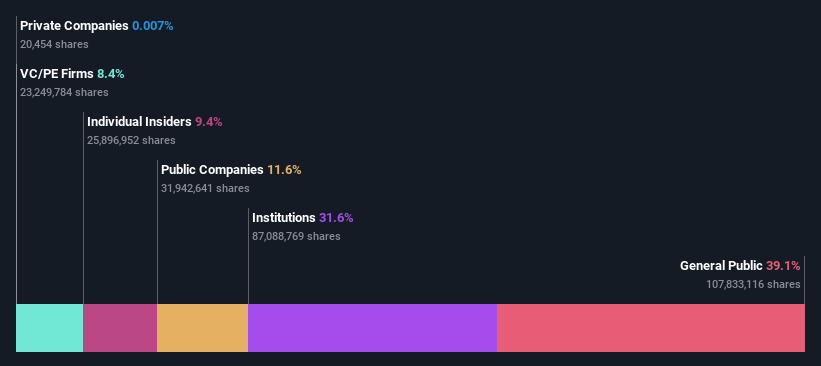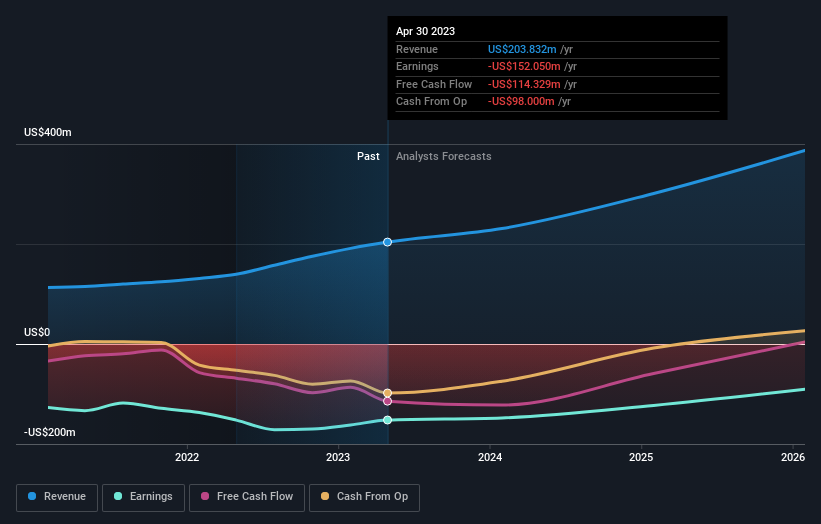Retail investors who hold 39% of Planet Labs PBC (NYSE:PL) gained 6.9%, institutions profited as well
Key Insights
Planet Labs PBC's significant retail investors ownership suggests that the key decisions are influenced by shareholders from the larger public
The top 13 shareholders own 51% of the company
A look at the shareholders of Planet Labs PBC (NYSE:PL) can tell us which group is most powerful. The group holding the most number of shares in the company, around 39% to be precise, is retail investors. In other words, the group stands to gain the most (or lose the most) from their investment into the company.
Retail investors gained the most after market cap touched US$894m last week, while institutions who own 32% also benefitted.
Let's take a closer look to see what the different types of shareholders can tell us about Planet Labs PBC.
See our latest analysis for Planet Labs PBC
What Does The Institutional Ownership Tell Us About Planet Labs PBC?
Institutional investors commonly compare their own returns to the returns of a commonly followed index. So they generally do consider buying larger companies that are included in the relevant benchmark index.
Planet Labs PBC already has institutions on the share registry. Indeed, they own a respectable stake in the company. This can indicate that the company has a certain degree of credibility in the investment community. However, it is best to be wary of relying on the supposed validation that comes with institutional investors. They too, get it wrong sometimes. When multiple institutions own a stock, there's always a risk that they are in a 'crowded trade'. When such a trade goes wrong, multiple parties may compete to sell stock fast. This risk is higher in a company without a history of growth. You can see Planet Labs PBC's historic earnings and revenue below, but keep in mind there's always more to the story.
Planet Labs PBC is not owned by hedge funds. The company's largest shareholder is Alphabet Inc., with ownership of 12%. For context, the second largest shareholder holds about 8.4% of the shares outstanding, followed by an ownership of 6.4% by the third-largest shareholder. In addition, we found that William Marshall, the CEO has 3.9% of the shares allocated to their name.
Looking at the shareholder registry, we can see that 51% of the ownership is controlled by the top 13 shareholders, meaning that no single shareholder has a majority interest in the ownership.
While studying institutional ownership for a company can add value to your research, it is also a good practice to research analyst recommendations to get a deeper understand of a stock's expected performance. Quite a few analysts cover the stock, so you could look into forecast growth quite easily.
Insider Ownership Of Planet Labs PBC
The definition of an insider can differ slightly between different countries, but members of the board of directors always count. The company management answer to the board and the latter should represent the interests of shareholders. Notably, sometimes top-level managers are on the board themselves.
Insider ownership is positive when it signals leadership are thinking like the true owners of the company. However, high insider ownership can also give immense power to a small group within the company. This can be negative in some circumstances.
Shareholders would probably be interested to learn that insiders own shares in Planet Labs PBC. In their own names, insiders own US$84m worth of stock in the US$894m company. Some would say this shows alignment of interests between shareholders and the board. But it might be worth checking if those insiders have been selling.
General Public Ownership
With a 39% ownership, the general public, mostly comprising of individual investors, have some degree of sway over Planet Labs PBC. This size of ownership, while considerable, may not be enough to change company policy if the decision is not in sync with other large shareholders.
Private Equity Ownership
With an ownership of 8.4%, private equity firms are in a position to play a role in shaping corporate strategy with a focus on value creation. Sometimes we see private equity stick around for the long term, but generally speaking they have a shorter investment horizon and -- as the name suggests -- don't invest in public companies much. After some time they may look to sell and redeploy capital elsewhere.
Public Company Ownership
It appears to us that public companies own 12% of Planet Labs PBC. This may be a strategic interest and the two companies may have related business interests. It could be that they have de-merged. This holding is probably worth investigating further.
Next Steps:
While it is well worth considering the different groups that own a company, there are other factors that are even more important. Consider risks, for instance. Every company has them, and we've spotted 3 warning signs for Planet Labs PBC you should know about.
If you are like me, you may want to think about whether this company will grow or shrink. Luckily, you can check this free report showing analyst forecasts for its future.
NB: Figures in this article are calculated using data from the last twelve months, which refer to the 12-month period ending on the last date of the month the financial statement is dated. This may not be consistent with full year annual report figures.
Have feedback on this article? Concerned about the content? Get in touch with us directly. Alternatively, email editorial-team (at) simplywallst.com.
This article by Simply Wall St is general in nature. We provide commentary based on historical data and analyst forecasts only using an unbiased methodology and our articles are not intended to be financial advice. It does not constitute a recommendation to buy or sell any stock, and does not take account of your objectives, or your financial situation. We aim to bring you long-term focused analysis driven by fundamental data. Note that our analysis may not factor in the latest price-sensitive company announcements or qualitative material. Simply Wall St has no position in any stocks mentioned.
Join A Paid User Research Session
You’ll receive a US$30 Amazon Gift card for 1 hour of your time while helping us build better investing tools for the individual investors like yourself. Sign up here

 Yahoo Finance
Yahoo Finance 

